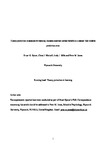Theory protection in associative learning: humans maintain certain beliefs in a manner that violates prediction error
| dc.contributor.author | Spicer, Stuart | |
| dc.contributor.author | Mitchell, Chris | |
| dc.contributor.author | Wills, Andy | |
| dc.contributor.author | Jones, Peter | |
| dc.date.accessioned | 2019-08-14T13:19:10Z | |
| dc.date.issued | 2019-09-26 | |
| dc.identifier.issn | 0097-7403 | |
| dc.identifier.issn | 2329-8464 | |
| dc.identifier.uri | http://hdl.handle.net/10026.1/14792 | |
| dc.description.abstract |
Three experiments were conducted to investigate a possible role for certainty in human causal learning. In these experiments, human participants were initially trained with a set of cues, each of which was followed by the presence or absence of an outcome. In a subsequent training stage, 2 of these cues were trained in a causal compound, and the change in associative strength for each of the cues was compared, using a procedure based on Rescorla (2001). In each experiment, the cues differed in both their causal certainty (on the part of participants) and size of their prediction error (with respect to the outcome). The cue with the larger prediction error was always the cue with the more certain causal status. According to established prediction error models (Bush & Mosteller, 1951; Rescorla, 2001; Rescorla & Wagner, 1972), a larger prediction error should result in a greater updating of associative strength. However, the opposite was observed, as participants always learned more about the cue with the smaller prediction error. A plausible explanation is that participants engaged in a form of theory protection, in which they were resistant to updating their existing beliefs about cues with a certain causal status. Instead, participants appeared to attribute outcomes to cues with a comparatively uncertain causal status, in an apparent violation of prediction error. The potential role of attentional processes (Mackintosh, 1975; Pearce & Hall, 1980) in explaining these results is also discussed. (PsycInfo Database Record (c) 2020 APA, all rights reserved). | |
| dc.format.extent | 151-161 | |
| dc.format.medium | Print-Electronic | |
| dc.language | en | |
| dc.language.iso | en | |
| dc.publisher | American Psychological Association | |
| dc.subject | associative learning | |
| dc.subject | prediction error | |
| dc.subject | theory protection | |
| dc.subject | redundancy effect | |
| dc.subject | uncertainty | |
| dc.title | Theory protection in associative learning: humans maintain certain beliefs in a manner that violates prediction error | |
| dc.type | journal-article | |
| dc.type | Journal Article | |
| plymouth.author-url | https://www.webofscience.com/api/gateway?GWVersion=2&SrcApp=PARTNER_APP&SrcAuth=LinksAMR&KeyUT=WOS:000522153200006&DestLinkType=FullRecord&DestApp=ALL_WOS&UsrCustomerID=11bb513d99f797142bcfeffcc58ea008 | |
| plymouth.issue | 2 | |
| plymouth.volume | 46 | |
| plymouth.publication-status | Published online | |
| plymouth.journal | Journal of Experimental Psychology: Animal Learning and Cognition | |
| dc.identifier.doi | 10.1037/xan0000225 | |
| plymouth.organisational-group | /Plymouth | |
| plymouth.organisational-group | /Plymouth/Admin Group - REF | |
| plymouth.organisational-group | /Plymouth/Admin Group - REF/REF Admin Group - FoH | |
| plymouth.organisational-group | /Plymouth/Faculty of Health | |
| plymouth.organisational-group | /Plymouth/Faculty of Health/Peninsula Medical School | |
| plymouth.organisational-group | /Plymouth/Faculty of Health/School of Psychology | |
| plymouth.organisational-group | /Plymouth/REF 2021 Researchers by UoA | |
| plymouth.organisational-group | /Plymouth/REF 2021 Researchers by UoA/UoA04 Psychology, Psychiatry and Neuroscience | |
| plymouth.organisational-group | /Plymouth/REF 2021 Researchers by UoA/UoA04 Psychology, Psychiatry and Neuroscience/UoA04 REF peer reviewers | |
| plymouth.organisational-group | /Plymouth/Research Groups | |
| plymouth.organisational-group | /Plymouth/Research Groups/Centre for Brain, Cognition and Behaviour (CBCB) | |
| plymouth.organisational-group | /Plymouth/Research Groups/Centre for Brain, Cognition and Behaviour (CBCB)/Cognition | |
| plymouth.organisational-group | /Plymouth/Research Groups/Institute of Health and Community | |
| plymouth.organisational-group | /Plymouth/Research Groups/Plymouth Institute of Health and Care Research (PIHR) | |
| plymouth.organisational-group | /Plymouth/Users by role | |
| plymouth.organisational-group | /Plymouth/Users by role/Academics | |
| dc.publisher.place | United States | |
| dcterms.dateAccepted | 2019-07-19 | |
| dc.rights.embargodate | 2019-12-4 | |
| dc.identifier.eissn | 2329-8464 | |
| dc.rights.embargoperiod | Not known | |
| rioxxterms.versionofrecord | 10.1037/xan0000225 | |
| rioxxterms.licenseref.uri | http://www.rioxx.net/licenses/all-rights-reserved | |
| rioxxterms.licenseref.startdate | 2019-09-26 | |
| rioxxterms.type | Journal Article/Review |


